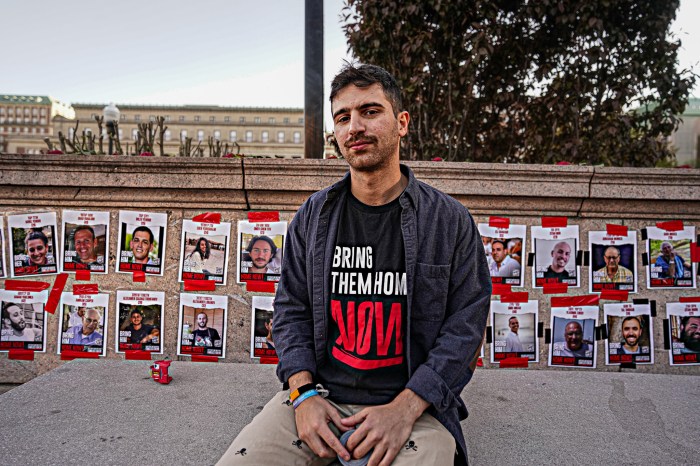 Advocates at a recent rally unfurled a blocks-long petition calling for better working standards at the airport. (Credit: Rikard Larma/Metro)
Advocates at a recent rally unfurled a blocks-long petition calling for better working standards at the airport. (Credit: Rikard Larma/Metro)
Employees of Philadelphia International Airport subcontractor PrimeFlight Aviation Services on Monday announced the filing of a number of federal complaints alleging hazardous workplace conditions.
The workers’ claims include a lack of training to deal with disabled passengers, poorly maintained and broken equipment – such as wheelchairs – and routine exposure to passengers’ bodily fluids without any personal protective equipment.
Service Employees International Union 32BJ on Thursday filed three complaints on behalf of the workers with the U.S. Department of Transportation name U.S. Airways, United Airlines and Southwest Airline Company, all of which use subcontractor PrimeFlight Aviation Services to employ skycaps, wheelchair attendants and baggage handlers at the Philadelphia International Airport.
The complaints allege PrimeFlight fails to adequately train wheelchair attendants to use the proper equipment or to recognize communication assistance requests from vision or hearing impaired passengers.
Documents claim many attendants received only several hours of training or were simply told to “shadow” an employee for a day to learn the ropes.
“As passengers aren’t able to help themselves, I have to help them on and off the plane,” said U.S. Airways wheelchair attendant Isaura Fernandez, who has worked for PrimeFlight for over two years.
“I have never seen training on how to do this.”
The complaints also claim PrimeFlight doesn’t properly store or maintain its wheelchairs, creating safety hazards.Subcontracted airport workers allege they are forced to use a wheelchair in some sort of poor condition on a weekly basis, at minimum.
“I have to use a wheelchair with only one brake that works.In that case, I have to use my foot to lock the wheel, which is dangerous for me and the passengers at the Philadelphia International Airport,” said U.S. Airways wheelchair attendant Nikisha Watson, who has also worked for PrimeFlight for over two years.
“Just last week, I reported two broken wheelchairs to a supervisor. These two wheelchairs are most likely to be still out on the floor today. I care about my passengers who come to the airport and don’t want to be responsible for anyone getting hurt.”
An additional complaint with the Occupational Safety and Health Administration, also filed Thursday on behalf of PrimeFlight Aviation employees, claims wheelchair attendants “are exposed on at least a monthly basis to urine, feces and/or vomit from passengers they are transporting” and that PrimeFlight doesn’t provide them with training on how to protect themselves from the risk of infection or with any personal protective equipment, such as gloves.
“I have had passengers vomit, have been exposed to blood and other bodily fluids, and every time I had to scramble to get cleaning products,” Watson said.
“We are not given cleaning products, gloves, any masks or hand sanitizer, and we’re definitely not getting the training on how to deal with accidents like this so we can stay safe and make sure that our passengers are properly taken care of.”
The complaint further alleges PrimeFlight doesn’t offer Hepatitis vaccinations to workers who are exposed to blood.
Subcontracted airport workers – whose employers haven’t been required to comply by the Philadelphia 21st Century Living Wage and Benefits Standard passed by City Council in 2005 – also complained of low wages and understaffing.
Fernandez said she makes $5.25 per hour plus tips – and tips often aren’t forthcoming.
“We are constantly understaffed and, oftentimes, I have to leave my passengers alone to pick up another passenger,” she said.
“Many times, I have had to leave elderly passengers at the exit gate by themselves and take the chair to pick up another passenger. This is no way to treat a passenger that needs our services.”
Advocates have long been fighting for improved working conditions at the airport. Philadelphia has embarked on a $6 billion expansion of the facilities, the largest public works project in the city’s history.
“It shouldn’t come as a shock that workers who are paid poverty wages at the airport also aren’t provided with functioning wheelchairs or the proper training to deal with bodily fluids and blood,” said 32 BJ Assistant Mid-Atlantic District leader Daisy Cruz.
“These are all symptoms of the underlying problem: the low-bid contracting system at the airport is a hazard for workers and for passengers. It’s a hazard for the city as a whole.”





























